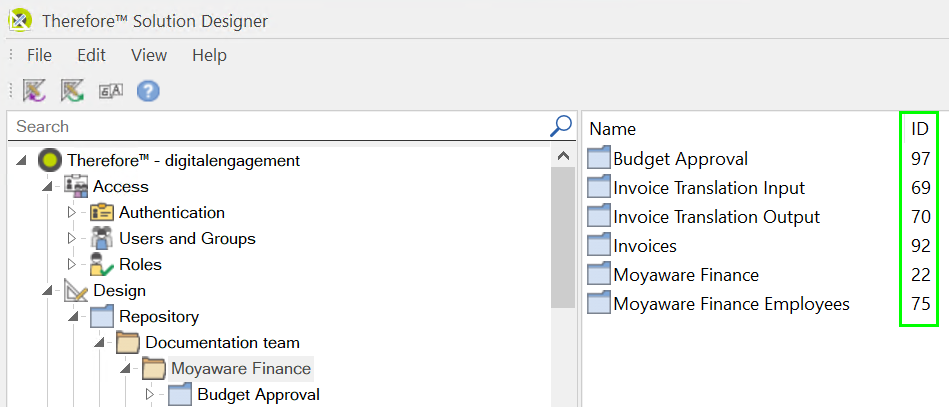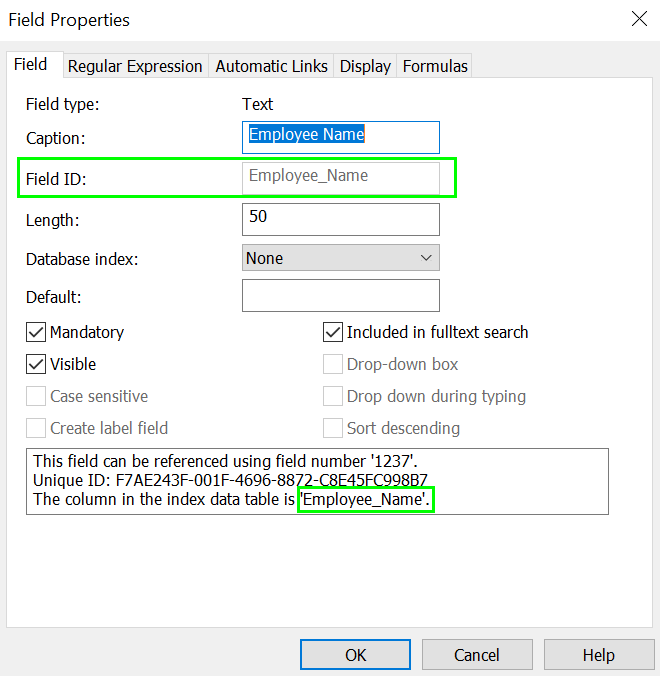URL Actions
There are a number of actions that can be performed in the Therefore™ Web Client using URLs. In turn, these could be triggered by a 3rd party application that has the needed integration capability.
Where to find unique IDs
In order for the URL actions to work, the unique IDs of categories, workflow processes, index data fields, etc. are needed.
Category IDs and workflow process IDs
Category IDs and workflow process IDs are displayed in the Therefore™ Solution Designer. Go to the repository and click on the folder containing the category or workflow process to find out their ID.

Field IDs
The unique field ID for an index data field can be found in the Therefore™ Solution Designer. Right-click on the category containing the index data field and select 'Open Category' to open the category definition. In the category definition, right-click on an index data field and select 'Properties' to open the Field Properties dialog. There, you can find the field ID.

Ad-hoc Task IDs, Document IDs, and workflow instance IDs
Search for the ad-hoc task, document, or workflow instance in any Therefore™ client (such as Therefore™ Navigator, Therefore™ Web Client or Therefore™ Go) to find out their unique IDs. The unique IDs are called "Task No.", "Document ID, and "Instance No." respectively.
List of URL actions
|
Open a workflow process |
URL pattern: Copy
Copy
|
|
Open a certain workflow instance |
URL pattern: Copy
Example: Copy
|
|
Look up a specific document |
URL pattern: Copy
Example: Copy
|
|
Create a new document in a specific category |
URL pattern: Copy
Example: Copy
|
| Show advanced search as default |
URL pattern: Copy
Example: Copy
|
Customizing hit-list results
URL actions also allow users to customize searches without leaving the hit-list itself. These changes are not saved and do not alter a saved search. The URL itself can be saved to access the modified search query.
When editing a search query, additional parameters can be added following an '&' symbol in the URL. These parameters must include a field ID, alongside an operator from the table below and reference value.
| Operator | Symbolic Notation | Example Usage |
|---|---|---|
| Smaller than (<) | lt | __<field_id>-lt=’value’ |
| Smaller than or equal to (<=) | lte | __<field_id>-lte=’value’ |
| Greater than (>) | gt | __<field_id>-gt=’value’ |
| Greater than or equal to (>=) | gte | __<field_id>-gte=’value’ |
| Equal (=) | eq | __<field_id>-eq=’value’ |
| Not equal (!=) | ne | __<field_id>-ne=’value’ |
| Range | from, to | __<field_id>-r=’value1’::’value2’ |
| Contains | c | __<field_id>-c=’value’ |
| Does not contain | nc | __<field_id>-n=’value’ |
| Starts with | sw | __<field_id>-sw=’value’ |
| Ends with | ew | __<field_id>-ew=’value’ |
Example
Hit-list results filtered to only display documents with the value of the 'Employee Name' field starting with 'An'.
https://moyawarefinance.thereforeonline.com/tdwv/#/repository/search/hitlist/category/75?queryNo=119&__Employee_Name-sw=AnTask hit-lists
The following keys and values can be used to create parameters for a query in relation to tasks in order to share it with other users or use in an integration.
| Keys | Values | Usage Example | Additional Information |
|---|---|---|---|
created_by
|
current_user; all_users |
Retrieve all tasks assigned to the current user:
|
|
assigned_to
|
current_user
|
Retrieve all tasks processed by the current user:
|
The key 'assigned_to' is optional. If it is not specified all tasks are shown. |
overdue
|
yes
|
Retrieve all overdue tasks created by the current user:
|
The key 'overdue' is optional |
status
|
in_progress; not_started; completed |
Retrieve all tasks created by the current user that have not been started:
|
The key 'status' is optional |
due
|
today; next_week |
Retrieve all tasks created by the current user that are due today:
|
Example:
Retrieve all completed tasks that were created by the current user.
https://moyawarefinance.thereforeonline.com/tdwv/#/tasks?status=completed&created_by=current_user